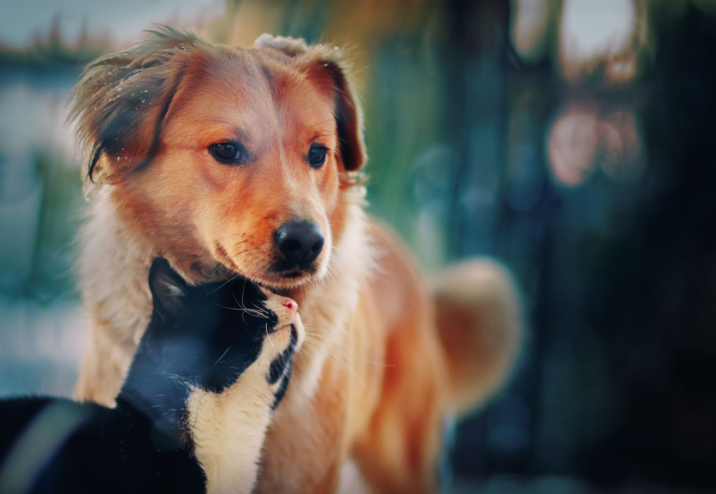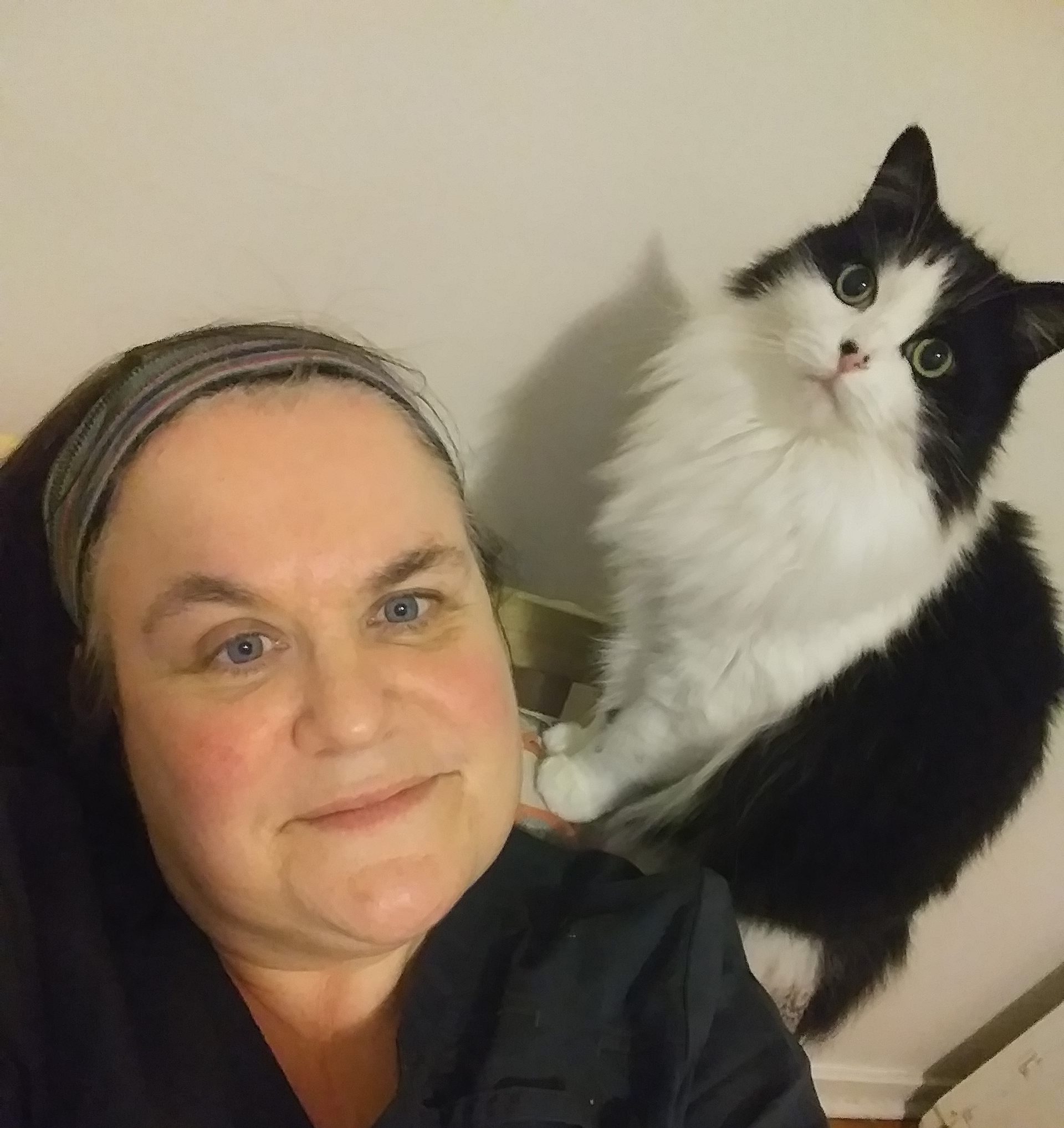The Rehabilitation Service at Oak West Animal Clinic offers veterinary rehabilitation to pets and their owners in London and the surrounding area on a referral basis. From post-surgical recovery to chronic conditions affecting your pets mobility, we are here to provide assistance to ensure your pets comfort and quality of life. We work with your regular veterinarian to help support you and your pets well being by offering a wide range of modalities to help address pain and improve strength, coordination and flexibility. Our goal is to work closely with owners to not only address their pets current issues, but contribute to their overall long-term well being in the long term.
Rehabilitation

- About Judith
- Services Offered
- Veterinary Referral form
- FAQ
- Our Partners
- Contact the Rehabilitation Service
About Judith
Originally from Alberta, Judith grew up in Kitchener-Waterloo. From a young age, she had a deep love for animals and shared her life with cats, rats, gerbils, mice and ferrets. She also volunteered at the Donkey Sanctuary of Canada and the Toronto Wildlife Centre.
After a brief foray into librarianship, Judith returned to school and graduated from Ridgetown College, University of Guelph and obtained her RVT in 2003. She then went on to work in private and emergency practices in Ontario and Nova Scotia. In 2006, she met a cat called Simon who had been beaten and thrown in a dumpster. Simon required specialized care in terms of acupuncture and massage to help him recover from his injuries, which awakened Judith’s passion for rehabilitation. In 2013 she obtained her Certified Canine Rehabilitation Practitioner designation from the University of Tennessee.
Judith joined the rehabilitation service at London Regional Veterinary Emergency and Referral Hospital in 2014 and went on to manage it from 2015 to 2023. During her time there, Judith worked with a wide variety of post-surgical, injured, geriatric and palliative patients.
Judith is very excited to join the team at Oak West Animal Clinic and to further develop the provision of rehabilitation services for the City of London and surrounding area. She enjoys the challenges that each case presents and the opportunities to work with clients to ensure that their pets have the best lives possible. She is committed to learning new skills and techniques and passing the benefits of this professional development on to her patients.
In her spare time she enjoys gardening, hiking, reading, cycling, swimming, playing the harp or just spending time with her cats, some of whom have all their body parts.

Services Offered
- Thermotherapy/cryotherapy
- Massage therapy
- Joint mobilizations
- LASER therapy
- Therapeutic ultrasound
- TENS
- NMES
- Therapeutic exercise
- Home exercise program
- Assistive device
- Home adaptations
FQA
Animal Rehabilitation FAQ
1) What is animal rehabilitation?
Animal rehabilitation is the animal version of physiotherapy in humans. It involves the use of human physical therapy techniques to increase the function and mobility of joints and muscles in animals. It is used to reduce pain and enhance recovery from injury, surgery, degenerative diseases, age-related diseases, and obesity.
2) What are the benefits of animal rehabilitation?
Animal rehabilitation can be beneficial for pets by helping to:
- Reduce pain
- Reduce inflammation
- Increase range of motion
- Improve balance and coordination
- Restore normal movement
- Restore normal muscle mass
- Increase muscle strength
- Encourage weight loss in obese patients
- Improve overall quality of life
3) Do you treat only dogs?
We offer animal rehabilitation is offered to all companion animals including cats and rabbits.
4) Which pets can benefit from physical rehabilitation?
Animal rehabilitation can benefit almost every pet suffering from a chronic inflammatory or neurological disease or recovering from an injury or wound. Conditions that might benefit from physical rehabilitation include:
- Degenerative joint disease or arthritis
- Hip dysplasia
- Tendon, ligament, and muscle injuries
- Rear limb weakness
- Paralysis
- Recovery from musculoskeletal surgery such as cruciate repairs, patellar luxations, and spinal surgery
- Traumatic injuries (e.g., being hit by a car)
- Intervertebral disc disease and other spinal injuries
- Nerve disorders
- Obesity
5) What type of treatments do you offer?
All treatments are tailored to the specific pet. Depending on the condition being treated, the following types of treatments are available:
- Massage — Techniques intended to relax muscles, reduce stress, improve circulation, and decrease pain in pets.
- Manual therapy – techniques intended to improve joint mobility and comfort through mobilization of the tissues surrounding joints.
- Passive range of motion — The practice of moving joints through their normal range in order to prevent loss of function in nonambulatory patients. to help patients regain their normal function during recovery, and improve circulation to cartilage for healing
- Transcutaneous electrical nerve stimulation (TENS) – The use of low-level electrical stimulation to stimulate the pain-relieving substances from nerves.
- Neuroelectrical muscular stimulation (NMES) – The use of electrical impulses to strengthen muscles and reduce muscle wasting in pets who suffer from temporary paralysis or who are unable to use specific muscles for a short period of time.
- Laser therapy — The use of penetrating light to decrease pain and inflammation while improving healing in patients with problems such as arthritis, surgical incisions, and other wounds.
- Therapeutic ultrasound — The use of sound waves of varying frequency and intensity to increase blood flow and facilitate wound healing when applied to tissues. This therapy can treat tendonitis, pain, muscle spasms, joint stiffness, scar tissue buildup, and wounds.
- Therapeutic exercises — The use of targeted exercises to improve strength, balance, and coordination. A wide range of exercises target specific muscle groups, strengthen core muscles, and rebuild muscle after disuse.
- Thermo/cryotherapy – The use of heat and cold therapy to assist with pain management, reduction of inflammation, and preparation of tissues for exercise and manual therapy
6) What can I expect at the first appointment?
The first appointment starts with collecting a detailed history of your pet. The therapist will then assess your pet by performing a gait analysis, assessing muscle mass and weight bearing, and determining specific areas of discomfort. Based on this information, the therapist will review the recommended treatment plan for your pet, discussing the recommended modalities. On your approval, treatments will be initiated immediately. You will also be provided with homework in the form of exercises, massage, and/or heat/cold treatment to be carried out at home until the next appointment.
In subsequent appointments, your pet’s progress will be reassessed. Your pet will continue to receive required treatments and the therapeutic exercise program will evolve to meet your pet’s needs.
7) How frequent are appointments and how many appointments are usually required?
In general, appointments start weekly. As your pet improves, the frequency is slowly reduced. Patients are generally seen for a total of six to eight sessions.
8) What are the goals of animal rehabilitation?
The goal is twofold: to help patients improve in comfort and mobility and to teach owners what they need to know to manage their pets in the long term.
9) Can anyone book an appointment for animal rehabilitation?
The rehabilitation service operates by referral from a veterinarian. In order to refer, they should complete the online form found here or below: Rehabilitation Referral Form.
Once received we will contact the client to set up the first appointment.
Our Partners
We work with a number of companies to provide products that help with your pets mobility and enhance their quality of life.
● Help Em UP Harnesses
● Dr McHenry’s Toe covers
● Eddies Wheels
● Handicapped Pets Canada
● Pawsability
Contact the Rehabilitation Service
1311 Riverbend Road,
London, ON, N6J 0J6
